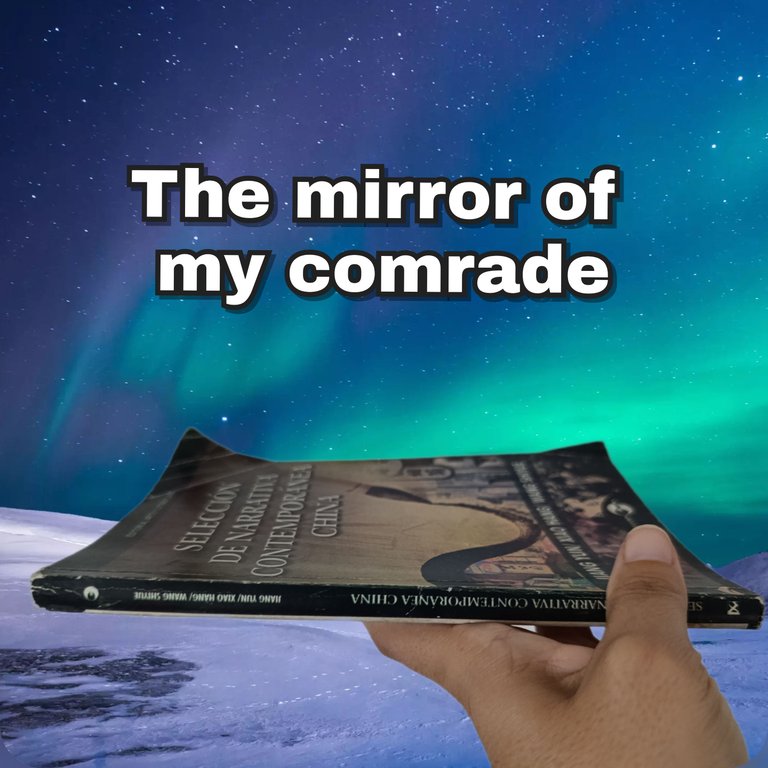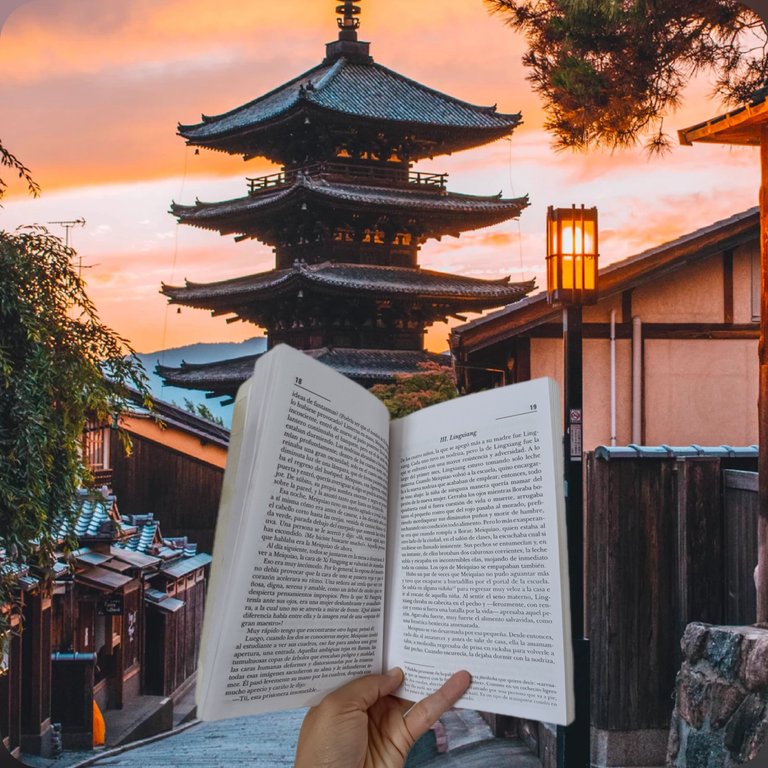Several years ago I read the novel The false notebook of Narciso Espejo by Guillermo Meneses, from there my fascination for this type of proposal was born, which leans towards the unfolding of characters and to involve the reader in the narrative, so that he/she tries to deduce what happened. For this reason, whenever I have the opportunity to approach this mode of representation in literature, I do not hesitate to do so.
Now I had the opportunity to read My Comrade's Mirror by Chinese author Xiao Hang, who uses the characters Pu Yifan and Cheng Yu to build an interesting story around a scientific research. The narrator tells us that both study, live and work together for many years, Pu Yifan being a genius in astronomy, while Cheng Yu is his subordinate and, therefore, remains under his shadow for a good stretch of the novel. As a differentiating point, Pu Yifan is passionate about classical landscape painting, while Cheng Yu initially shows no interest in art.
Both characters exhibit an evident contrast in their personalities, which will be accentuated as the story progresses. The mission assigned to the group of fifty scientists led by Pu Yifan is to discover the first ray of light in the universe, for that reason, he heads the project Looking at the stars where Cheng Yu is second in command, due to his proximity to the boss.

A situation is presented that justifies a rupture, Pu Yifan is indignant when he observes that the group under his command is lazy, remains waiting for him to do the research, while receiving remuneration for participating in the program. Underlying the narrative is this denunciation of the bureaucratic system that distinguishes Chinese society, where the high population rate complicates the immediate execution of orders and the assignment of priorities.
Faced with an existence that was moving towards frustration and bitterness, Pu Yifan devises a plan to disappear after stealing a valuable painting. This is the breaking point, from here the narrative is oriented towards the proposal of the mirror, where changes gradually occur so that one character adopts the characteristics of the other. To consolidate his work, Xiao Hang places the narrative focus on Cheng Yu, who is presented as a witness with certain privileges.
Cheng Yu is described as a gray scientist whose aspiration in life is to have a wife and live quietly, while Pu Yifan is a scientific genius, bohemian, gambler, womanizer and great painter. Another character who contributes to the mirror theory is Yu Tong, the female figure, since she is the romantic interest of both of them for several years, without making a decision when Pu Yifan disappears.

And an apt way to justify the transition and absence is through memory loss, albeit rather cruel because it refers to Alzheimer's, where not only memories are destroyed but also the sense of orientation and the ability to solve basic problems and routine tasks. Although the narrative suggests that Pu Yifan decided to argue that he was losing his memory in order to live in anonymity.
The novel introduces the painting "The Empty Mountain after the Rain" as a relevant element to the story. Pu Yifan's skills as an artist are so brilliant that he manages to forge it into a replica. If we sharpen our gaze, and look at the original painting that exists in reality, that mountain can be the protagonist and around it the process of transformation it faces. The rain has the power to heal, clean and refresh the earth, it also gives the sensation of a fog, like Alzheimer's that does not allow us to look inside.
I enjoyed reading Xiao Hang, it is a different proposal in which various theories and postulates in relation to outer space and the formation of the stars, not in vain this author, in addition to being a writer, is a scientific researcher. **The Mirror of My Comrade" has an interesting plot that keeps the reader attentive from the first to the last page.
Versión en EspañolHace varios años realicé la lectura de la novela El falso cuaderno de Narciso Espejo de Guillermo Meneses, de allí nació mi fascinación por este tipo de propuesta que se inclina hacia el desdoblamiento de personajes y a involucrar al lector en la narración, para que intente deducir lo que ocurrió. Por tal razón, cada vez que tengo la ocasión de abordar este modo de representación en la literatura, no dudo en hacerlo.
Ahora tuve la oportunidad de leer El espejo de mi camarada del autor chino Xiao Hang, quien utiliza a los personajes Pu Yifan y Cheng Yu para construir una interesante historia alrededor de una investigación científica. El narrador nos indica que ambos estudian, viven y trabajan juntos desde hace muchos años, siendo Pu Yifan un genio en astronomía, en tanto Cheng Yu es su subordinado y, por lo tanto, permanece bajo su sombra durante un buen trecho de la novela. Como punto diferenciador se señala que Pu Yifan es un apasionado de la pintura clásica de paisajes, en cambio Cheng Yu al principio no muestra interés por el arte.
Ambos personajes exhiben un evidente contraste en sus personalidades, lo que se acentuará mientras avanza la historia. La misión asignada para el grupo de cincuenta científicos liderado por Pu Yifan es descubrir el primer rayo de luz en el universo, por tal razón, encabeza el proyecto Mirando las estrellas donde Cheng Yu es segundo al mando, debido a su proximidad con el jefe.

Se presenta una situación que justifica una ruptura, Pu Yifan se indigna al observar que el grupo bajo su mando es perezoso, permanece a la espera de que él haga la investigación, devengando de igual manera una remuneración por participar en el programa. En la narración subyace esta denuncia contra el sistema burocrático que distingue a la sociedad china, donde la alta tasa demográfica complica la ejecución inmediata de órdenes y la asignación de prioridades.
Ante una existencia que transitaba hacia la frustración y la amargura, Pu Yifan idea un plan para desaparecer tras robar un valiosa pintura. Este es el punto de quiebre, a partir de aquí la narración se va orientando hacia la propuesta del espejo, donde paulatinamente acontecen cambios para que un personaje adopte las características del otro. Para consolidar su obra, Xiao Hang ubica la focalización narrativa en Cheng Yu, quien se presenta como testigo con ciertos privilegios.
Cheng Yu es descrito como un científico gris cuya aspiración en la vida es tener una esposa y vivir tranquilamente, en cambio Pu Yifan es un genio científico, bohemio, apostador, mujeriego y gran pintor. Otro personaje que contribuye a la teoría del espejo es Yu Tong, la figura femenina, puesto que es el interés romántico de ambos durante varios años, sin llegar a tomar una decisión salvó cuando Pu Yifan desaparece.

Y una forma acertada de justificar la transición y ausencia es mediante la pérdida de la memoria, aunque bastante cruel porque refiere al Alzheimer, donde no solamente se destruyen recuerdos sino también el sentido de la orientación y la capacidad para resolver problemas básicos y tareas habituales. Aunque la narración nos sugiere que Pu Yifan decidió argumentar que estaba perdiendo la memoria para vivir en el anonimato.
La novela introduce la pintura "La montaña vacía después de la lluvia" como elemento relevante para la historia. Las habilidades de Pu Yifan como artista son tan brillantes que logra falsificarla hasta concebir una réplica. Si agudizamos la mirada, y se observa la pintura original que existe en la realidad, esa montaña puede ser el protagonista y a su alrededor el proceso de transformación que afronta. La lluvia tiene el poder de sanar, limpiar y refrescar la tierra, además concede la sensación de una neblina, como el Alzheimer que no permite observar hacia adentro.
Me gustó leer a Xiao Hang, es una propuesta diferente en la cual reposan diversas teorías y postulados en relación al espacio exterior y la formación de las estrellas, no en vano este autor, además de escritor, es investigador científico. El espejo de mi camarada posee una trama interesante que mantiene atento al lector desde la primera hasta la última página.
✓Photos from my personal gallery, edited with Fotocollage.
✓Text translated with DeepL.
📙📚📙📚📙📚📙📚📙📚
✓Fotos de mi galería personal, editadas con Fotocollage.
✓Texto traducido con DeepL.
Posted Using INLEO